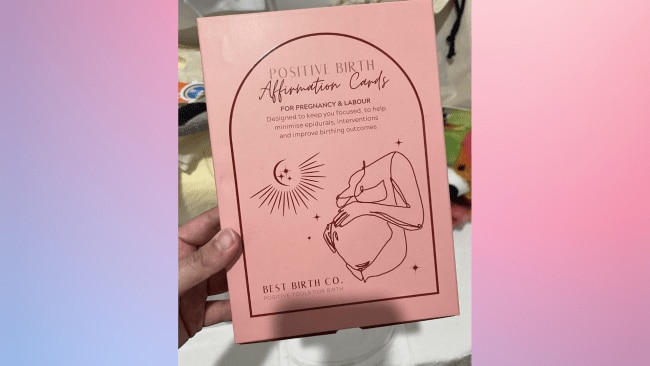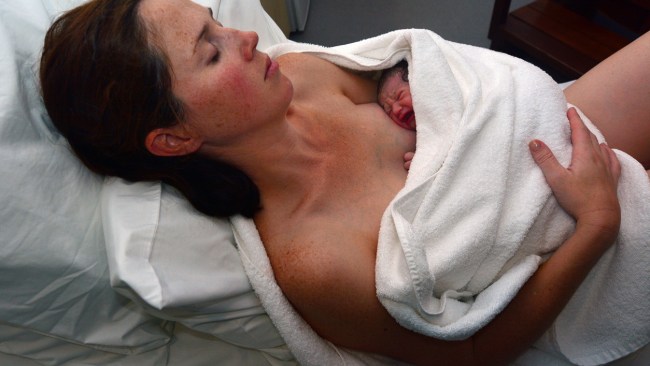It read: ‘For pregnancy and labour - to help minimise epidurals'
Do these cards tell women that if they ask for help, they are weak?
On yet another doom scroll on social media, I came across an interesting product that was targeting me.
It was for a box of cards that said, ‘Positive Birth Affirmation Cards’.
It then said, ‘For pregnancy and labour, designed to keep you focused, to help minimise epidurals, interventions and improve birthing outcomes’.
When I looked into them further, I saw they included cards like, ‘My pelvis opens with ease’ and ‘I soften, open and release’.
Want to join the family? Sign up to our Kidspot newsletter for more stories like this.
My own experience
I can’t help but feel these cards are actually pretty dangerous.
In the lead-up to giving birth to my daughter, my plan was not to have a plan.
I attended pre-natal classes and felt empowered with the knowledge of my options available and the potential that could occur, but I never had a strict birth plan.
I wanted to listen to my body and the advice of the midwives to ensure a safe delivery for my baby and my health and well-being.
I liked the idea of a natural water birth but always said if I needed some relief or intervention, I would make the decision when it presented itself.
After labouring at home for six hours, I arrived at the hospital 8 centimetres dilated and very much ready for an epidural.
The midwife advised me I didn’t have time as the rate my labour was progressing, my daughter would be here before we knew it.
I jumped into the bath and endured another two hours of contractions only to be told I hadn’t dilated any further and if I wanted the epidural, I could opt for one then.
I was proud of my body for reaching where it did, and if I could continue the journey without being in so much pain, I felt that was right for me.
Of course, every woman has the right to decide on their birth journey, but I wanted to enjoy my experience, and I couldn’t do that without an epidural.
I still had an incredibly positive experience, and after three hours of pushing, my daughter was born.
Introducing our new podcast: Mum Club! Listen and subscribe wherever you get your podcasts so you never miss an episode.

Two sides of the coin
Now, if I had subscribed to the affirmation cards telling me a positive birth is one that is without epidurals and medical intervention, I would have failed.
I had my husband with me (the most positive person you'll ever meet), who gave me my version of positive affirmations and support; however, it was a lot more than mind over matter for me.
Do these cards tell women that if they ask for help, they are weak?
I decided to ask this question, fellow mums to get their opinions on these cards.
“I think reminding yourself that what you’re feeling is what’s meant to be experienced is always helpful,” said the mum of one, Jenna.
“However, there is nothing wrong with needing an intervention if that’s what you want or need.”
Mum of two, Lara agreed and said, “Totally agree. The birth of a healthy baby is a successful and positive birth.”
Mum to three little boys, Jess warned, “Positive is a mindset and has nothing to do with medical interventions.
“I hate to think that women would look back on their birth as a failure because they had an epidural or emergency C-section if the baby or mother needed it.”
And mum of two, Lisa said, “I wanted to minimise intervention but was also open to whatever was going to be safest.
“I think these cards should come with a medical advice warning.”

Traumatic births in Australia
The NSW Parliament revealed that “research suggests that up to 1 in 3 women identify their birth experience as traumatic”, with “Psychological birth trauma is estimated to affect between 10% to 44% of women”.
According to the Australasian Birth Trauma Association, “Birth Trauma is a woman’s experience of interactions and/or events related to childbirth that cause overwhelming distressing emotions and reactions, leading to short and/or long-term negative impacts on a woman’s health and well-being.”
Birth-related trauma can be “physical or psychological or a combination of both” and can impact not only mothers but birthing parents, fathers and non-birthing parents.
That said, I think cards like these should be used as a tool, not an ultimatum. I think it’s really healthy to practice mindfulness– I kept telling myself through each contraction, ‘Each one is bringing me closer to my baby’, but nobody should feel like they failed because they wanted or needed help.
Childbirth is such an incredible physical feat and shouldn’t come with feelings of failure.
Your body is doing what it can, and that’s all that should be focused on.
More Coverage
Originally published as It read: ‘For pregnancy and labour - to help minimise epidurals'




